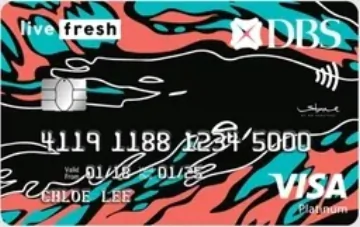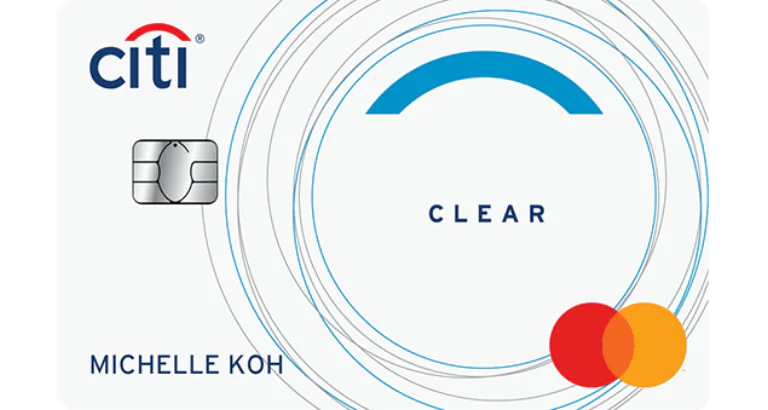Best College Student Credit Cards of 2026
Updated: 1 Jan 2026
The information on this page is for educational and informational purposes only and should not be considered financial or investment advice. While we review and compare financial products to help you find the best options, we do not provide personalised recommendations or investment advisory services. Always do your own research or consult a licensed financial professional before making any financial decisions.
Unlock the perfect card for your lifestyle and financial goals.
Looking to optimise your finances? Whether your priority is saving on interest charges or maximising rewards, we can help you find the ideal credit card.
Our pick for: Going out and staying in
DBS Live Fresh Student Card
- Enjoy 5% Cashback on McDonald's, Starbucks, Golden Village, Netflix and Spotify.
- Enjoy additional 5% Green Cashback on selected eco-friendly Eateries, Retailers, and Transport Services.
- 0.3% Cashback on All Other Spend
- 5 Years Annual Fee Waiver
- No minimum spend required
- No minimum income required
- Mobile contactless rebate
- Local spending rebate
- No income required
- Monthly credit limit of S$500
- Monthly cashback cap of S$50
- Rebate cap applied
DBS Live Fresh Student Card
- Annual fee: S$196.20
- Waiver requirements: 1 year annual fee waiver
- Cashback rate: Up to 6%
- Minimum annual income: S$30,000
- Minimum spend: N/A
Rewards breakdown
- 0.3% Unlimited cashback on all card spend
- 5.7% bonus cashback on shopping spend
- 5.7% bonus cashback on transport spend
Card details
-
0.3% unlimited cashback on all card spend, no minimum spend required
-
Total minimum spend of S$800 needed to unlock 5.7% bonus cashback for shopping and transport spend
-
Additional 5.7% cashback for in-store and online shopping, capped at S$50 per calendar month
-
Additional 5.7% cashback for transport spend including ride-hailing apps and SimplyGo, capped at S$20 per calendar month
-
0% processing fee and 0% interest on 3-month installment with DBS Payment Play (for purchases on DBS Live Fresh Card over S$100)
-
Exclusive 1-for-1 deals via DBS
-
24/7 Visa concierge for access to exclusive services, amenities, and privileges
-
Annual fee waiver for 1st year
SingSaver’s take
The DBS Live Fresh Card lets you maximise the rewards you get from your daily spends with up to 6% cashback on Shopping and Transport spends and 0.3% base cashback on all other card spend.
Pros
With up to 6% cashback on Shopping and Transport, including in-store, digital, local, and overseas spend, the DBS Live Fresh Card is ideal for students who want to earn rewards and build up their credit without needing to spend in excess. Even if you don’t hit the S$800 monthly minimum spend requirement, you’ll still get 0.3% unlimited cashback on all spending — rewarding you for your daily routine.
Cons
The minimum spend requirement may be steep for some especially if you don’t have any major recurring payments to make each monthly. Bonus cashback for Shopping and Transport spends is also capped at a total of S$70 per month (S$50 for Shopping and S$20 for Transport), which is a little lower compared to an unlimited cashback card.
Our pick for: Simplicity and value
Citi Clear Card
- Earn 1X Point* for every S$1 spend
- Enjoy exclusive dining deals at over 1,000 eateries in Singapore
- Enjoy online fashion, lifestyle and travel exclusives at your favourite online brands
- No min. annual income requirement
- Earn 1X Point* for every S$1 spend
- Enjoy exclusive dining deals at over 1,000 eateries in Singapore
- • Enjoy online fashion, lifestyle and travel exclusives at your favourite online brands
Citi Clear Card - Student Credit Card
- Annual fee: S$30.52
- Waiver requirements: 1st year waived
- Rewards rate: 1 ThankYouSM Point per S$1 spend
- Minimum annual income: N/A
- Minimum spend: N/A
Rewards breakdown
- 1 ThankYouSM Point per S$1 spend
Card details
-
Earn 1X Point* for every S$1 spend
-
Enjoy exclusive dining deals at over 1,000 eateries in Singapore
-
Enjoy online fashion, lifestyle and travel exclusives at your favourite online brands
-
No minimum annual income requirement
-
No monthly minimum spend requirement
-
Cardholder minimum age of 18 years old
-
25-day interest free period
SingSaver’s take
With no annual income requirement or monthly minimum spend requirement, the Citi Clear Card is one of the most basic, fuss-free credit cards available for students in Singapore. The minimum cardholder age requirement of 18 years old also makes it an option for younger students.
Pros
Owning the Citi Clear Card doesn’t just earn you rewards, it gives you access to exclusive Citi dining, lifestyle, shopping, travel, and entertainment deals as well. This makes it great for students who are on a budget or watching their spending, but still want to have fun with friends.
Cons
The 1X rewards rate is pretty limited – if you have a higher monthly spending, there are definitely other cards out there offering better rewards and deals.
Our pick for: Travel rewards (for established credit)
OCBC Frank Card
- Enjoy 8% cashback on foreign currency transactions.
- Enjoy 8% cashback on online/contactless mobile transactions in SGD.
- Enjoy 2% cashback at selected green merchants.
- Annual fee waiver of 2 years
- Contactless payment
- Overseas rebate
- Online shopping rebate
- Minimum spend of S$800 required to earn higher cashback rate.
- Cashback capped at S$100 per month.
- Automatic annual fee waiver requires min. annual spend of S$10,000.
- Monthly spend required
OCBC FRANK Credit Card
- Annual fee: S$196.20
- Waiver requirements: Waived for first 2 years, automatic waiver with min. spend of S$10,000 in one year from date of issue
- Cashback rate: Up to 10%
- Minimum annual income: S$30,000
- Minimum monthly spend: N/A
Rewards breakdown
- 8% cashback on foreign currency transactions and online/contactless mobile transactions in SGD
- 2% bonus cashback on spend at selected green merchants
Card details
-
8% cashback on all local online purchases or on purchases made in foreign currency, including in-store payments via Apple Pay, Samsung Pay, Google Pay or Garmin Pay
-
Additional 2% cashback on spend at selected green merchants like Scoop Wholefoods, Little Farms, SimplyGo, BlueSG and more
-
Up to S$100 monthly cashback with minimum spend of S$800 a month online or in any store that accepts contactless mobile payment
-
Visa Click to Pay option available for online payments (where applicable)
-
Annual fee waiver for first two years
-
Annual fee automatically waived if you spend a minimum of S$10,000 in one year, starting from the month after your FRANK Credit Card was issued ($0 annual fees for the first 2 years)
-
Two designs (Obsidian and Vortex) available for cardholders to choose from
SingSaver’s take
Designed with the needs and lifestyles of young adults in mind, the OCBC FRANK Card offers exclusive benefits and perks from up to 10% cashback to personalised card designs. Notably, it delivers bonus rewards when you shop at selected green merchants, making it a favourable option for sustainability-minded shoppers.
Pros
If your regular monthly spend comes to at least S$800 per month, you’ll have no problem maxing out the bonuses on your OCBC FRANK Card (up to S$100 cashback per month). Plus, spending at selected green merchants unlocks a bonus 2% cashback rate, rewarding you for going green and shopping sustainably.
Cons
The base 0.3% cashback rate is pretty low if you don’t meet the minimum spend of S$800 per month. You also don’t unlock the full maximum 10% cashback without spending at selected green merchants (which grants you the bonus 2% cashback rate), which can feel limited compared to other cashback cards where the bonus spend applies to more generic categories. It also requires a minimum income of S$30,000 (for Singaporeans or PRs) which you might not be eligible for unless you’re at an internship that pays well or juggling part-time studies alongside a full-time job.
Full list of editorial picks: Best college student credit cards
DBS Live Fresh Student Card
Our pick for: Maximising contactless and online cashback
If your wallet lives on your phone and your weekends revolve around Shopee hauls or GrabFood orders, this card’s your new BFF. Score up to 10% cashback every time you tap to pay online or offline (yes, even for that last-minute bubble tea run). Overseas? You’ll still get 0.3% cashback – not bad for a backup! Plus, no annual fees mean more cash for midnight suppers.
OCBC Frank Card
Our pick for: Overseas spending and study-abroad essentials
Semester in Sydney? Exchange program in Tokyo? This card’s got your back with 8% cashback on foreign transactions (think flights, Airbnb, and even that Kyoto ramen binge). Just hit S$800/month – easy when you’re booking hostels and buying textbooks. Bonus: Earn the same rate on local online shopping for when you’re homesick.
Citi Clear Card
Our pick for: Flexible rewards on everyday spending
Textbooks, Spotify Premium, Zara sales – this card turns all your spending into rewards. Earn 1X point for every S$1 spent, then swap points for cashback, shopping vouchers, or even flight miles for your post-exam getaway. No annual fee for the first year? That’s a student win.
Maybank eVibes Card
Our pick for: No-strings-attached cashback
Hate math? This card’s as simple as it gets: 1% cashback on everything, no minimum spend, no categories to track. Swipe it at the canteen, for your phone bill, or even on campus merch – you’ll earn rewards without overthinking. Perfect for students who want a “set-and-forget” card.
Other resources
Why it’s wise to build credit as a student
Building a good credit history is like starting an investment that pays off later. As a student, you might not need a credit card right away, but establishing good credit early can open doors to financial opportunities in the future. Think of it as laying the groundwork for your financial freedom.
A strong credit history demonstrates responsible financial behaviour, which is essential when you apply for loans, mortgages, or auto financing down the road. Lenders use your credit score to assess your creditworthiness, and a higher score can lead to lower interest rates and better loan terms, which can save you significant money over time. And using a credit card responsibly is one of the quickest and easiest ways to do so!
Here's a breakdown of why building credit as a student is a smart move:
-
Better loan terms: When you apply for loans in the future, a good credit score can get you lower interest rates. This means you'll pay less over the life of the loan, saving you money.
-
Easier approvals: Landlords, utility companies, and even potential employers often check credit scores. A good credit history increases your chances of getting approved for an apartment, securing utilities without a deposit, or even landing a job.
-
Financial freedom: Building good credit habits early sets you up for financial success later in life. It gives you more flexibility and options when it comes to managing your finances.
-
Preparation for the future: As you transition from student life to adulthood, having good credit becomes increasingly important for major financial decisions like buying a home or starting a business.
-
Credit card access: Starting with a student credit card can help you build a positive credit history, making it easier to qualify for better credit cards with more perks and rewards in the future.
See and track your credit score
Ready to take control of your credit? Check your credit score for free with SingSaver's credit monitoring tool and stay on top of your financial health.
>> MORE: The best credit cards for fresh graduates in Singapore
Who should apply for a student credit card
Student credit cards are designed for those who are just starting their credit journey. Here's a breakdown of who can benefit most from a student credit card:
-
First-time credit card users: If you've never had a credit card before, a student card is a great way to start building your credit history.
-
Students with limited credit history: Even if you've had a credit card before, a student card can help you improve your credit score if you have a limited credit history.
-
Students with a part-time job: Having a part-time job demonstrates some level of income, which can increase your chances of getting approved for a student credit card.
-
Students who want to learn responsible credit card usage: A student credit card can be a valuable learning tool for managing your finances and building good credit habits.
-
Students who want access to student-specific perks: Many student credit cards offer perks like discounts on food, entertainment, and travel, which can be helpful for students on a budget.
>> MORE: When can I apply for a credit card
Alternatives to student cards (and options for non-students)
If you're not a student or don't qualify for a student credit card, there are other options to explore:
-
Prepaid cards: These cards function like debit cards, requiring you to load funds onto them before making purchases. They don't build credit but can be a good way to manage your spending.
-
Debit cards: Linked directly to your bank account, debit cards allow you to spend only the money you have available. They don't build credit but are widely accepted.
-
Entry-level credit cards: Some cards aim to help people build credit from scratch. In fact, credit cards for people with no credit have less stringent eligibility requirements and can be a good option for those with limited or no credit history.
How to compare student credit cards
When comparing student credit cards, consider these key factors to ensure you find the card that best suits your needs and financial goals.
>> MORE: The best credit cards for fresh graduates in Singapore
Credit reporting
Building a strong credit history starts with responsible credit card usage and timely payments. However, it's equally important to ensure that the card you choose reports your activity to Credit Bureau Singapore. This creates a comprehensive record of your positive credit behaviour, which is crucial for future credit applications and securing favourable loan terms.
Annual fee
As a student, it's often wise to minimise unnecessary expenses. Annual fees can add up, especially if you're on a tight budget.
Opt for cards with low or no annual fees to keep costs down and focus on building credit without the burden of extra charges. Many student credit cards offer waived annual fees for the first year or even longer, so compare the fee structures of different cards before making your decision.
Introductory and ongoing interest rates
Pay close attention to both the introductory and ongoing interest rates offered by different student credit cards. Some cards may offer a low or even 0% introductory interest rate for a limited period, which can be helpful for managing larger purchases or spreading out payments.
However, it's crucial to consider the ongoing effective interest rate (EIR), which will apply after the introductory period ends. A competitive EIR can help you manage your balance responsibly and minimise interest charges in the long run.
Rewards
Reward programmes can add value to your credit card experience, allowing you to earn cashback, miles, or points on your spending. However, not all reward programmes are created equal.
Consider your spending habits and choose a card with a rewards structure that aligns with them. For example, if you frequently dine out, a card with bonus rewards on dining might be a good fit. Ensure the reward rate is substantial enough to justify using the card and contributes meaningfully to your financial goals.
Foreign transaction fees
If you plan to study abroad or travel internationally, foreign transaction fees can significantly impact your spending power. These fees are typically a percentage of each transaction made in a foreign currency and can quickly add up. Opt for a card with low or no foreign transaction fees to minimise costs and maximise your spending ability while abroad.
International acceptance
The acceptance of different credit card networks varies across countries. Visa and Mastercard tend to have the widest global acceptance, while American Express and Discover might have limitations in certain regions. If you plan to use your card internationally, ensure the card's network is widely accepted in the countries you'll be visiting or residing in to avoid any inconvenience or limitations on your spending.
>> MORE: Best credit cards for overseas spending in Singapore
Security deposit (for secured cards)
Secured credit cards require a security deposit, which typically serves as your credit limit. This deposit acts as collateral for the issuer, reducing their risk and making these cards more accessible to those with limited or no credit history.
When comparing secured credit cards, consider the security deposit requirements and ensure you understand the terms for getting your deposit back, such as closing the credit card account in good standing or upgrading to an unsecured card.
Making the most of your student credit card
While being a student can make it easier to qualify for a student credit card, responsible credit card usage is key to building good credit. Simply having a student card isn't enough by itself to qualify for a student card; you need to use it wisely to establish a positive credit history. Here are some essential tips for student cardholders:
-
Buy only what you can afford: Treat your credit card like a debit card. Only charge what you can comfortably repay each month to avoid falling into debt and incurring interest charges. Create a budget and track your spending to stay on top of your finances.
-
Pay on time and in full every month to avoid interest: Timely payments are crucial for building a positive credit history. Paying your balance in full each month, within the grace period, also helps you avoid interest charges, saving you money and keeping your credit utilisation low.
-
If you can't pay your full balance, pay more than the minimum: If circumstances prevent you from paying your full balance, make an effort to pay more than the minimum amount due. This reduces interest charges and helps you pay off your balance faster.
-
Use only a portion of your available credit: Keeping your credit utilisation low (ideally below 30%) is essential for maintaining a healthy credit score. Avoid maxing out your credit card, as this can negatively impact your creditworthiness.
-
Be strategic with your sign-up bonus and rewards: If your card offers a sign-up bonus, plan your spending to meet the requirements without overspending. Utilise bonus categories to maximise your rewards and redeem them for benefits that align with your financial goals.
-
Keep your account open if possible: A longer credit history demonstrates financial stability and can positively influence your credit score. If your student credit card has no annual fee, consider keeping the account open even if you don't actively use it.
>> MORE: 14 credit card mistakes you didn’t know you’re making
What to do with your student credit card after graduation
As you transition to the next chapter as a fresh graduate, whether that's entering the workforce or continuing your education in graduate school, here's what you can do with your student credit card:
-
Keep using it: If your student credit card has no annual fee and offers benefits that still align with your needs, continue using it responsibly. This helps maintain a long credit history and contributes to a positive credit score.
-
Upgrade it: As your financial situation and lifestyle evolve, consider upgrading your student credit card to one with better rewards or perks that best suit your post-graduation needs. Many banks offer upgrade options for existing cardholders.
-
Replace it: If your student credit card has an annual fee or no longer meets your requirements, explore other credit card options and apply for a card that better aligns with your current circumstances.
-
Keep it – but in a drawer: If your student credit card has no annual fee and you've transitioned to a different primary card, consider keeping the student card account open but inactive. This helps maintain the length of your credit history, which can be beneficial for your credit score.
Frequently asked questions about student credit cards
College student credit cards are specifically designed for students who are new to credit or have a limited credit history. They typically have lower credit limits and may offer student-friendly perks like discounts on food, entertainment, or travel. They also often have less stringent eligibility requirements compared to regular credit cards, making them easier for students to obtain.
Student credit cards are generally easier to get approved for than regular, non-student credit cards, but you'll still need to meet certain eligibility criteria. Having a part-time job or a co-signer can improve your chances of approval. It's important to research the specific requirements of each card and ensure you meet them before applying.
In Singapore, you generally need to be at least 18 years old to apply for a credit card, including student credit cards. However, some cards may have higher age restrictions or require a parent or guardian's consent if you're under 21.
While having a part-time job can improve your chances of getting approved for a student credit card, it's not always a strict requirement. Some cards may consider alternative forms of income or allow a parent or guardian to co-sign the application.
If you're unable to get approved for a student credit card, consider alternative options like becoming an authorised user on a parent's credit card or applying for a secured credit card. These options can help you build credit and eventually qualify for a student or regular credit card in the future.



